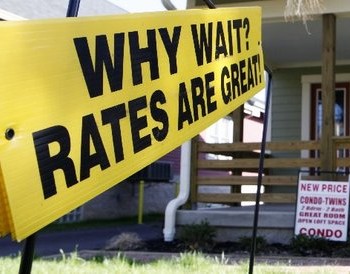 Low interest rates and a stronger job market continue to fuel growth in housing. While the number of national home sales declined slightly in 2014 (3 percent) to 4.93 million, home prices have continued to rise. In fact, according to the National Association of Realtors, the national median existing home price was up 5.8 percent in 2014 to $208,500, the highest level since 2007 ($219,000).
Low interest rates and a stronger job market continue to fuel growth in housing. While the number of national home sales declined slightly in 2014 (3 percent) to 4.93 million, home prices have continued to rise. In fact, according to the National Association of Realtors, the national median existing home price was up 5.8 percent in 2014 to $208,500, the highest level since 2007 ($219,000).
Despite the fact that the easy money in real estate may have already been made by those who purchased after the credit market meltdown, now may still be a great time to buy. Before making what is most likely the largest investment in your life, consider watching out for these common home buying pitfalls that could prove costly.
Taking on more than you can afford
Saddling yourself with excessive mortgage debt is one of the most critical mistakes to avoid. Remember, you cannot rely on a bank to determine how much home you can afford. Despite the tightening of lending standards since 2008, mortgage companies can and will approve you for significantly more house than you should be purchasing or can afford - often pushing you to the brink of becoming house-poor. Run your own numbers, taking into consideration renovations, furnishings and the potential for increases in real estate taxes over time.
Consider completing a detailed budget to ensure that you will continue have discretionary income to save for retirement, education funds or other goals you may after closing on your new home. If you can afford the home only if you cut back on retirement savings, you really can't afford the home. Also be sure that you do not deplete cash reserves to satisfy a down payment - an emergency fund is even more critical after committing to a home purchase.
Being a weak negotiator
The reduction in supply, especially of short sales/distressed sales in many markets has been turning the real estate market into less of a "buyer's market" than it has been in the past. Still, you should not be afraid to be a tough negotiator. Keep in mind, most sellers do not list their property at the price they expect to receive. Rather, they list at a price that provides them with some "wiggle room" to negotiate. Do not be afraid to play hard ball and be prepared to negotiate for any repairs or damages that turn up in the home inspection. If the repairs have to be done, use this as leverage to have the buyer contribute toward addressing these unexpected costs.
Letting your emotions get the best of you
From overpaying for a property to overlooking repair issues, falling in love with a property can cause buyers to do foolish things. Do your best to avoid making it an emotional decision. At the end of the day, your home is an investment and letting your emotions rule the process can lead to poor decision making. As much as it may seem like the home you are looking at is the only house for you, there are usually other opportunities out there.
House hunting prior to preapproval
Shopping for real estate before you know what you can afford and what size mortgage you will be approved for may not be the best use of time for you or any other professionals you are working with. Sure, window shopping online to get an idea what the market looks like in your area is great idea. However, going to the negotiating table with your agent before having clarity on how much you are actually approved for may be a mistake. After vetting multiple mortgage companies and settling on whom you are most comfortable with, find out how much you can be pre-approved for. Remember, there is a difference between preapproved and prequalified. Prequalification is quick and based only on estimates of your credit score and financials. In contrast, a mortgage application based on actual data is necessary for preapproval and is preferred by most sellers as it more indicative of the buyer being able to close the deal and obtain the mortgage. Also, be sure not to show all your cards by letting the sellers know the maximum amount you are preapproved for. Instead, consider presenting a preapproval letter for the exact amount of your offer.
Failing to shop around for your mortgage
Mortgage rates can vary drastically between lenders - as much as 0.75 percent of the loan. Closing costs, which run between 2 and 5 percent of the loan amount also add up, pushing the mortgage annual percentage rate even higher. Consider visiting online resources such as Zillow.com or Bankrate.com to assess your options. Comparison shop and consider utilizing online mortgage and affordability calculators at the sites noted above as they too, can help you get a better handle on how the variation in rates can affect your monthly payment and cash flow.
Getting a subpar home inspection
A home inspection is a critical step in the home-buying process as it may identify issues and help prevent purchasing someone else's repair problems. Unfortunately, many homebuyers cut corners and end up with a substandard inspection. First, be sure not to choose an inspector based solely upon lowest cost or a recommendation from your agent. Certainly speak to anyone referred, but also consider seeking out multiple inspectors to assess the thoroughness of their process. Next, make sure that all buyers attend the inspection. It is a great opportunity to learn the ins and outs of the property you are purchasing. While an inspection is essential, even for new construction, it is important to remember that the inspection process will not necessarily uncover all issues that may be present.
Kurt J. Rossi, MBA is a Certified Financial Planner, Practitioner & Wealth Adviser. He can be reached for questions at 732-280-7550, kurt.rossi@Independentwm.com or www.Independentwm.com. LPL Financial Member FINRA/SIPC.








